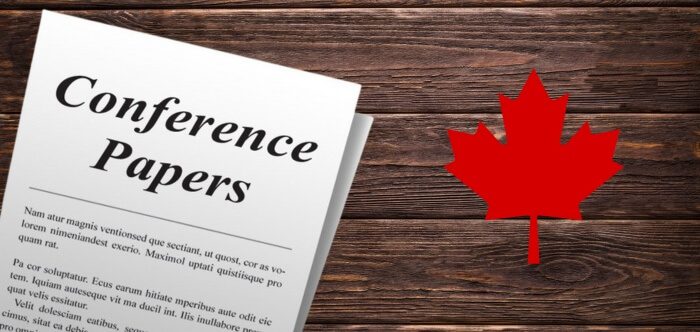In the dynamic realm of academic research, where knowledge evolves at a rapid pace, scholars often find themselves at a crossroads when it comes to selecting references for their work. A burning question that frequently arises in this context is: “Are conference papers good for references?”
Yes, conference papers can be good references, especially in specific fields where they contain valuable research and insights. However, their credibility may vary, so it’s essential to assess each paper’s quality and relevance to your research.
In this blog, we’ll explore using conference papers as references. We’ll discuss their pros and cons and provide tips on how to use them effectively in your academic work. By the end, you’ll know when and how to use conference papers in your research.
Concept of Conference Paper
Conference papers are vital professional contributions to both academic and artistic gatherings, including international arts and educational conferences. Researchers and scholars present their work to peers, sharing insights that take months or years to develop. Crafting such a paper involves distilling extensive research into a concise presentation. The challenge lies in highlighting the most significant aspects of the study. This process requires a delicate balance between depth and conciseness to ensure that the presentation maintains interest and clarity, making it both informative and engaging for a diverse international audience.
Presenting the paper allows for direct peer review and engagement. This interaction often leads to collaborative opportunities and feedback. The process is integral for academic growth and networking among professionals. Post-conference, papers usually join the annals of academic literature. This inclusion provides a global platform for the research. It ensures wider dissemination and the potential for citations in future scholarly works.
Are Conference Papers Good for References?
In the busy world of academic research, one pivotal question often emerges, prompting scholars to pause and ponder: “Are conference papers good for references?”
Yes, it is. Conference papers possess distinct advantages when it comes to referencing. They offer a snapshot of cutting-edge research, providing insights into the latest developments within specific fields. Access to diverse perspectives and the opportunity to network with fellow scholars are added benefits.
However, their utility is not without its caveats. The credibility and quality of conference papers can vary widely, demanding a discerning eye. Thus, the decision to incorporate conference papers as references necessitates a thoughtful evaluation.
To effectively utilize conference papers as references, researchers must assess their relevance to their work, investigate the credibility of the conference itself, and scrutinize the author’s credentials. A balanced approach, integrating conference papers judiciously with peer-reviewed sources, is crucial. Ultimately, conference papers can be valuable references, provided they are used with diligence and a keen awareness of their context and limitations.
How to Use Conference Papers as References in Your Academic Work?
Conference papers can be valuable references in academic work, offering insights into the latest research within specific fields. Leveraging them effectively requires a systematic approach. Here’s a guide on how to use conference papers as references in your academic endeavors:
Identifying Relevance
To begin, carefully assess the relevance of a conference paper to your research. Ensure that it aligns with your research topic, addresses your research questions, or supports your thesis. Seek out papers that contribute substantively to your work.
Evaluating Credibility
Next, evaluate the credibility of the conference where the paper was presented. Recognized conferences often have stringent review processes, ensuring the quality of the papers presented. Verify the reputation and standing of the conference within your academic discipline.
Author Credentials
Scrutinize the credentials of the paper’s author(s). Investigate their academic background, expertise, and affiliations with reputable institutions. Authors with a strong track record in the field enhance the reliability and authority of the paper.
Extracting Key Information
Extract essential information from the conference paper, including the title, author(s), publication date, and pertinent findings or arguments. This information will form the basis for accurate citation and referencing in your academic work.
Using Citation Styles
Adhere to the appropriate citation style consistently when referencing conference papers. Ensure that you include all essential details in your citations, such as the paper’s title, conference name, date, page numbers, and electronic access information if applicable.
Balancing with Peer-Reviewed Sources
Maintain a delicate balance between conference papers and peer-reviewed sources in your academic work. While conference papers offer timeliness and diverse perspectives, peer-reviewed journals provide a higher degree of rigor and reliability.
Cross-Checking Information
Perform cross-checks by verifying the information presented in conference papers against other credible sources. This practice helps ensure the accuracy and validity of your references and research findings.
Staying Updated
Recognize that conference papers may undergo revisions or corrections after their initial presentation. Stay vigilant by tracking any updates to ensure that your references remain up-to-date and accurate.
Citing Electronically Published Papers
For conference papers published electronically, incorporate the DOI (Digital Object Identifier) or a stable URL in your references. This facilitates easy access for your readers and enhances the professionalism of your work.
Acknowledging the Nature of Conference Papers:
When referencing conference papers, acknowledge their provisional nature and potential limitations. Transparently convey to your readers that these sources represent ongoing research and may evolve over time.
By adhering to these steps, you can harness the potential of conference papers as valuable references in your academic work, enriching your research with the latest insights while maintaining academic accuracy and integrity.
Pros and Cons of Using Conference Paper as a Reference
Before using conference papers as references in your academic work, it’s crucial to weigh their advantages, disadvantages, and their relevance to your research. This evaluation will help you make informed decisions about incorporating them into your scholarly endeavors.
Pros:
Here are some advantages of Using Conference Paper as a Reference:
- Timeliness: Conference papers often present the latest research findings, making them highly current and relevant.
- Diverse Perspectives: They offer a wide range of insights from various researchers and institutions.
- Networking: Conferences provide opportunities to connect with experts in your field and potential collaborators.
- Emerging Trends: Valuable for exploring emerging research areas with limited peer-reviewed publications.
- Rapid Dissemination: Ideal for disseminating research quickly, especially when findings have practical applications.
- Inclusive: Conferences may include work from researchers worldwide, fostering a global perspective.
- Interdisciplinary Insights: Conference papers can bridge knowledge gaps by merging ideas from different disciplines.
Cons:
Here are some disadvantages of Using Conference Paper as a Reference:
- Variable Quality: Quality and rigor may vary significantly between conference papers.
- Limited Peer Review: Some papers may lack rigorous peer review, affecting their reliability.
- Incomplete Information: Conference papers may lack the depth and detail found in peer-reviewed journals.
- Provisional Nature: Research presented at conferences may evolve or be revised after initial presentation.
- Credibility Issues: The credibility of the conference itself can impact the trustworthiness of its papers.
Conclusion
The use of conference papers as references in academic research presents both opportunities and challenges. These papers offer the advantage of timeliness, diverse insights, and networking opportunities. They are particularly valuable for exploring emerging trends and facilitating the swift dissemination of research.
However, their reliability can vary, with some lacking thorough peer review and containing incomplete information. Additionally, their provisional nature and potential for updates require cautious consideration. The credibility of the hosting conference also influences their trustworthiness.
So, are conference papers good for references? Yes, when chosen thoughtfully. To make the most of them, researchers should carefully assess their relevance and quality, balancing them with peer-reviewed sources. By doing so, conference papers can be a valuable asset in enriching academic work with the latest insights while maintaining academic accuracy.








